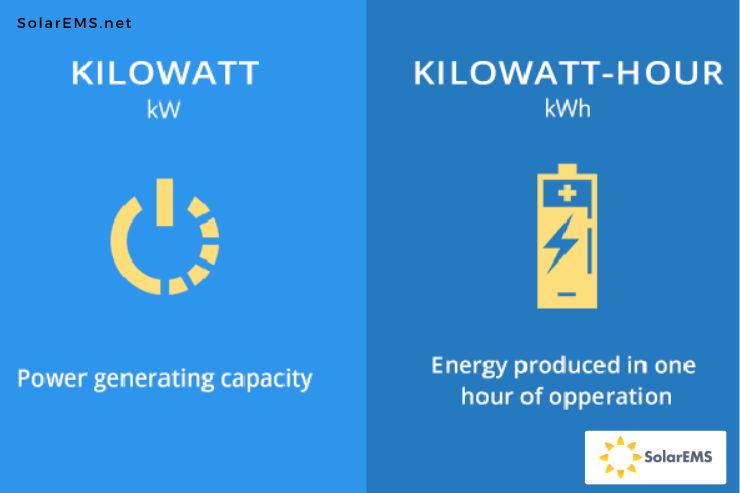Whenever we see the two terms, KW on our electrical appliances and KWh on our electricity bills every month, it is often confusing how they both connect and how they affect our bills. If we know what exactly is kW vs kWh, then we probably figure out how our electricity provider calculates our bills, why some appliances use extra energy, how much time each appliance is working, and how to save costs on them. In this article, I’ve tried to cover all these queries such as what is the difference between kW and kWh and how they are calculated, and much more.
Explanation of Kilowatts (kW) and Kilowatt-hours (KWh)

Kilowatts (kW) is a measure that is used to express electricity in terms of power and kilowatt-hours (kWh) is a measure that is used to express electricity in terms of energy.
Importance of understanding the difference
The importance of understanding kW and kWh lies in the fact that they are two such measures that help us measure our electricity usage. If we have an understanding of how our electricity bills are measured, we can cut down our bills by reducing electricity usage.
This is not just beneficial for homeowners but also for business owners to cut down the cost by reducing the usage at the time of peak hours which is measured in kW as compared to normal usage which is measured in kWh.
Understanding kW (Kilowatts)
Definition of Kilowatt
A kilowatt refers to the rate at which the electricity is consumed by appliances at a point in time. It is measured in terms of power. Higher the kW of any electrical device, the more power they require.
Calculation of Kilowatts
Calculation of kilowatt is very simple, just divide the total watts consumed by any of the appliances such as the refrigerator by 1000. For example, if a refrigerator takes 300 watts of electricity, then in terms of KW it is 300/1000, or 0.3 KW.
Examples of Kilowatts in Everyday Life
Here is the list of examples of kilowatts in everyday life:
- Mixer: 500 watts = 0.5 KW
- Oven: 850 watts = 0.85 KW
- Fan: 60 watts = 0.06 KW
- AC: 2600 watts = 2.6 KW
- LED TV: 85 watts = 0.085 KW
Understanding KWh (Kilowatt-Hours)
Definition of Kilowatt-Hour
A kilowatt-hour refers to the rate at which the electricity is consumed by appliances over a period such as in hours. It is measured in terms of energy usage in an hour. Higher the kW of any electrical device, the more power it requires, and eventually higher the kWh it needs.
Calculation of Kilowatt-Hours
The formula of kWh equals a kilowatt of an appliance multiplied by the period it works. Suppose a refrigerator takes 0.3 KW of power and it works 24 hours a day, then the calculation of kWh is as follows:
- The kWh hours of electricity used by refrigerator in a day: 0.3 kW X 24 hours = 7.2 kWh
- The kWh hours of electricity used by refrigerator in a month: 7.2 kW X 30 days = 216 kWh
- After knowing the monthly kWh for the refrigerator, let’s calculate the total power cost to be paid in a month. Suppose our electricity provider charges $.05 per kWh, then the total amount to be paid will be equal to 216 kWh X $.05 per kWh = $10.8 per month.
So, if the total electricity bill in a month is $50, then around 21% of it just includes the refrigerator part. Therefore, we should take the necessary steps to reduce electricity consumption, such as purchasing an energy-efficient refrigerator, avoiding opening the door from time to time, etc.
Examples of Kilowatt-Hours in Everyday Life
Here is the list of examples of kilowatts in everyday life:
- Mixer: 0.5 kW X 1 hour = 0.5 kWh per day
- Oven: 0.85 kW X 2 hours = 1.7 kWh per day
- Fan: 0.06 kW X 22 hours = 1.32 kWh per day
- AC: 2.6 kW X 12 hours = 31.2 kWh per day
- LED TV: 0.085 kW X 12 hours = 1.02 kWh per day
Difference Between kW and kWh
Comparison of kW and kWh
| Points of Difference | kW | kWh |
| Meaning | It is a measure of power consumed by an electrical appliance. | It is a measure of energy consumed by an electrical appliance. |
| Short form for | Kilowatt | Kilowatt-hours |
| Formula | 1 kW = Watt of power of an electrical appliance divided by 1000W | 1 kWh = KW consumed by an electrical appliance multiplied by the number of hours in a day an appliance works. |
| Example | A 50-watt bulb would consume 0.05 kW of power. | A 50-watt bulb working for 15 hours a day would consume 0.75 kWh of energy. |
When to Use kW and kWh
kW measures the power and it is the rate at which energy is used by any electrical appliance. It is a static measure and therefore cannot be used by electrical companies to measure electricity usage. Here, comes the kWh which measures the energy used by an electrical appliance in the number of hours in a day. It is something that we buy from electricity companies and is observed in the meters of our homes.
Examples of How kW and kWh are Used in the Energy Industry
The best way to explain the future of energy usage and kW and kWh is through solar panels. We often found out that solar panels reduce our monthly electricity bills but how, let’s see this:
If I have purchased 0.4 kW of solar panels, then it will produce this much output at a point in time, if it gets full sunlight. But this measure is incomplete and cannot be used to analyze how much energy it will give to my refrigerator which needs 7.2 kWh in a day. Suppose I am getting 5 hours of energy at my place and it fully charges a solar panel in a day, then it will produce 2 kWh of energy in a day which can run the refrigerator for around 6 hours in a day.
Therefore, both the kWh and kW are used to know how much electricity we need and how much a solar panel can produce in a day. Wherever purchasing a solar panel, we should always check the kWh of energy it produces and not just the kW.
Final Words
Therefore, after knowing the difference between kW vs kWh, we can surely compare how much electricity is consumed by each appliance and can also try to find ways to minimize it. If we are purchasing the solar panels and one company is giving the price in terms of kW and another in kWh then they should not be compared without conversion. However, the best decision is to use the kWh because that is what matters the most and that is how the electricity bills also get printed.
This article is better than any other article because it has covered pointwise differences between the kW and kWh along with examples that help the readers to quickly understand the terms.
Frequently Asked Questions (FAQs) about kW and kWh
What is a watt?
A watt, symbolized as “W” is a term used to express the unit of power an electric appliance needs to run. The formula to calculate watt equals volts, represented by V multiplied by amperes of current, represented by A. In simple words, a watt is equal to a joule per second.
What is a megawatt?
A megawatt (MW) is a unit measure that is equal to 1 thousand kilowatt-hours or 1 million watts. It is generally used to measure the power usage of large appliances or places such as in a city or town or by a power plant.
How do I calculate the cost of energy?
The steps to calculate the cost of energy are:
Multiply the kilowatts of electricity consumed by all the appliances by the total number of hours they work in a day.
Convert this to a monthly usage by multiplying it by 30.
The resulting value will be kilowatt-hours (kWh), which is then multiplied by the per kWh electricity cost. The final value is the amount that we have to pay to the electricity company per month.
What is the difference between AC and DC power?
AC (alternating current) is one type of flow where the electric charge can flow in any direction whereas DC (direct current) is another type of flow where the electric charge moves in one direction only.
How do kW and kWh impact my energy bill?
Though the energy bills come in the form of kWh, the kW holds importance also. The kWh on the bill represents the wattage of all the electrical appliances which is then multiplied by the total number of hours of electricity consumed in a month. The wattage of all the electrical appliances is what is represented by kW and therefore the higher the kW of electrical appliances, the more electricity they consume, and therefore more will be bill amount.
How much kWh does a home use in a day?
The kWh a home uses in a day equals the value of kWh on the monthly electricity bill divided by the number of days in a month.

